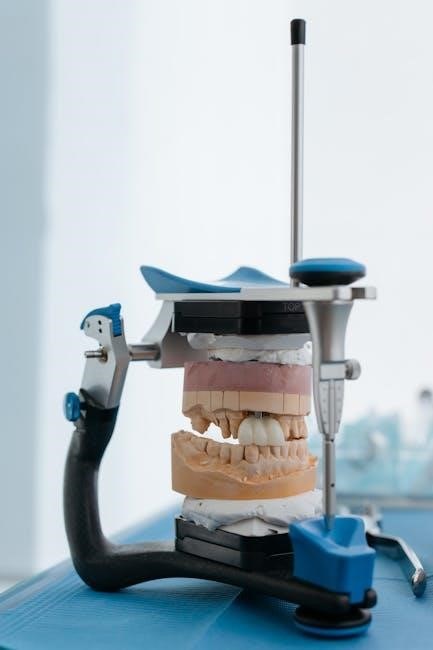Immediate dentures are a transformative solution for restoring function and aesthetics after tooth loss. Proper post-operative care ensures healing‚ comfort‚ and adaptation to your new dentures.

Immediate Post-Op (First 24 Hours)
Expect swelling and pain to decrease gradually. Avoid removing the denture‚ hot liquids‚ and chewing. Use ice for swelling‚ take prescribed medications‚ and sleep inclined.
Bleeding after immediate denture placement is normal but should be managed carefully. Avoid rinsing‚ spitting‚ or using a straw for 24 hours‚ as this can dislodge clots and worsen bleeding. Gently bite on gauze if provided by your dentist. Do not remove the denture during the first 24 hours‚ as this can disturb the surgical site. If bleeding is heavy or persistent‚ contact your dentist immediately. Applying ice to the affected area can help reduce bleeding and swelling. Follow all post-operative instructions to ensure proper healing and minimize complications. Pain management is crucial for comfort during the healing process. Take prescribed pain medications‚ such as ibuprofen or acetaminophen‚ as directed by your dentist. These medications help reduce discomfort and inflammation. Avoid chewing or applying pressure on the denture‚ as this can exacerbate pain. If pain persists or worsens‚ contact your dentist for further guidance; Rest and avoiding strenuous activities can also aid in managing discomfort. Follow the prescribed regimen to ensure proper healing and minimize post-operative pain. Stick to a soft‚ non-chewing diet for the first few days to minimize discomfort and protect the surgical site. Avoid hot liquids‚ spicy foods‚ and alcohol. Opt for foods like yogurt‚ mashed potatoes‚ and soft-cooked vegetables. Cold soups and smoothies are also recommended. Do not use a straw or smoke‚ as this can dislodge the blood clot or irritate the area. Gradually introduce softer solid foods as healing progresses. A gentle diet supports healing and ensures the denture fits comfortably without causing additional irritation or discomfort during the recovery period. Apply ice packs to reduce swelling‚ sleep with your head elevated‚ and monitor for excessive swelling or discoloration. Follow these steps to aid recovery. Apply an ice bag or cold compress to the swollen area for 15-minute intervals‚ alternating with 15-minute breaks. This helps reduce swelling and discomfort. Repeat as needed throughout the day‚ especially in the first 48 hours post-surgery. Ensure the ice is wrapped in a cloth to avoid direct contact with the skin. Consistent ice application during the initial healing phase promotes faster recovery and minimizes bruising. Follow this method diligently to achieve optimal results and ease your post-operative experience. Sleep with your head elevated using extra pillows to reduce swelling and promote healing. Avoid lying flat or turning your head sharply‚ as this can dislodge the denture or irritate the surgical site. Keep your head in a neutral position to minimize discomfort and ensure the denture remains stable. Elevating your head helps reduce fluid accumulation and promotes proper blood circulation‚ which is crucial during the initial healing phase. This position also minimizes the risk of post-operative complications and supports overall recovery. Maintain this posture consistently for the first few nights to enhance your comfort and healing process. Monitor swelling by observing the affected area daily. Note any changes in size‚ color‚ or firmness. Apply ice packs as directed to reduce swelling. Watch for signs of infection‚ such as increased redness‚ warmth‚ or fever. If swelling persists or worsens‚ contact your dentist immediately. Track progress to ensure healing is on schedule. Proper monitoring helps identify potential issues early‚ ensuring timely intervention. Keep a mental or written log of changes to discuss during follow-ups. This proactive approach supports optimal recovery and minimizes complications. During the first week‚ avoid removing dentures except for cleaning. Rinse gently with cold water and mild soap. Reinsert promptly to maintain healing. Ensure proper fit and hygiene to promote recovery and comfort. Follow all dentist instructions closely for optimal results. After the first 24 hours‚ you can remove your denture for cleaning. Wash your hands thoroughly before handling it. Gently take it out‚ ensuring not to bend or force it. Over a basin of water or a soft surface to prevent damage if dropped. Rinse with cold water and mild soap‚ then reinsert. Avoid using harsh chemicals or abrasive materials that could harm the denture. Proper removal and care are crucial for maintaining its fit and your oral health. Always follow your dentist’s specific instructions for removal and cleaning. After the initial 24 hours‚ clean your denture daily to maintain hygiene and prevent bacteria buildup. Use a soft-bristled toothbrush and mild soap or denture cleaner. Gently scrub all surfaces‚ paying attention to areas where the denture contacts your gums. Avoid using harsh chemicals‚ abrasive toothpaste‚ or hot water‚ as these can damage the material. Rinse thoroughly with cold water before reinserting. Additionally‚ clean your tongue‚ gums‚ and any remaining teeth to promote overall oral health. Regular cleaning ensures a proper fit and prevents irritation or infection. Always follow your dentist’s recommendations for cleaning products and techniques. A follow-up appointment is crucial for ensuring proper healing and denture fit. Your dentist will assess the healing progress‚ check for any signs of complications‚ and make necessary adjustments to the denture. This visit allows the dentist to address any discomfort or issues with the fit. Typically scheduled within a few days to a week after placement‚ this appointment ensures the denture remains functional and comfortable. Attending follow-up appointments is vital for long-term success and satisfaction with your immediate dentures. Your dentist will also provide personalized guidance to aid in your recovery and adaptation to the denture. Maintaining proper oral hygiene is essential for healing and comfort after receiving immediate dentures. Gently clean the denture with liquid soap and water‚ avoiding abrasive materials. After the first 24 hours‚ rinse your mouth with warm salt water to promote healing. Use a soft toothbrush to clean surrounding tissues and remaining teeth. Avoid using harsh mouthwashes or products containing alcohol. Proper care ensures the denture fits well and reduces the risk of complications. Regular cleaning also prevents the buildup of bacteria‚ which is crucial during the recovery period. Always handle the denture with care to avoid damage. Pain management is crucial for comfort after immediate denture placement. Use prescribed medications like ibuprofen or acetaminophen as directed to alleviate discomfort and inflammation during recovery. Medications play a key role in managing post-operative discomfort. Your dentist may prescribe or recommend over-the-counter pain relievers like ibuprofen or acetaminophen to alleviate soreness and inflammation. Always follow the dosage instructions provided by your dentist to avoid complications. It’s important to take medication with food to prevent stomach discomfort. Pain levels typically decrease within a few days‚ but consistency in taking prescribed medications ensures a smoother recovery. Avoid mixing medications without consulting your dentist‚ and never exceed the recommended dosage. Proper use of pain relief aids in healing and helps you adapt to your immediate dentures more comfortably. Post-operative discomfort varies and may include soreness‚ tenderness‚ or pressure in the gums and surrounding tissues. Some patients experience mild irritation or sensitivity‚ especially during the initial adaptation period. The denture may feel tight or slightly loose‚ causing temporary unease. Additionally‚ swelling and inflammation in the extraction sites can contribute to overall discomfort. These sensations are typically temporary and diminish as the mouth heals and adjusts to the denture. Monitoring these symptoms and reporting any unusual or persistent pain to your dentist is crucial for ensuring proper healing and a comfortable fit. It is essential to contact your dentist if you experience severe pain‚ excessive bleeding‚ or difficulty breathing. Persistent swelling‚ loose dentures‚ or signs of infection such as fever or redness require immediate attention. If your denture causes discomfort or fails to fit properly‚ notify your dentist promptly. Additionally‚ unusual numbness‚ tingling‚ or discharge at the surgical site should be reported. Early intervention ensures proper healing and prevents complications‚ so do not hesitate to reach out if any concerning symptoms arise. After receiving immediate dentures‚ it is crucial to follow a soft-food diet to minimize discomfort and avoid dislodging the blood clot. Avoid hot liquids‚ alcohol‚ and spicy foods for the first 24 hours. Opt for cold‚ soft foods like yogurt‚ mashed potatoes‚ and soups. Chewing directly on the denture should be avoided to prevent irritation. Stay hydrated with cold water and consider blending meals for easier consumption. Gradually introduce normal foods after the first week‚ prioritizing soft textures like cooked vegetables and tender meats. This approach supports healing and ensures a smooth adaptation to your new dentures. Proper long-term care for immediate dentures is essential for their durability and your comfort. Clean your dentures daily with mild soap and water‚ avoiding abrasive materials. Store them in a protective case when not in use to prevent damage. Regular dental check-ups are crucial to ensure proper fit and address any issues early. Dentures typically need replacement every 5-7 years due to wear and tissue changes. Avoid using harsh chemicals or hot water‚ as they can warp the denture. By maintaining good care habits‚ you can extend the life of your dentures and maintain optimal oral health. Immediate dentures can sometimes lead to complications‚ such as irritation or discomfort‚ especially during the initial adaptation period. Poor fit or excessive movement of the denture may cause sore spots or gum irritation. In some cases‚ patients may experience difficulty chewing or speaking temporarily. Additionally‚ improper care or removal can lead to damage or misalignment of the denture. Regular follow-ups with your dentist are crucial to address these issues promptly and ensure proper adjustment. While complications are rare‚ they can be minimized with careful adherence to post-operative instructions and proper maintenance of the denture. Immediate dentures may require adjustments to ensure a proper fit and comfort. Your dentist may need to make minor modifications‚ such as relining or trimming‚ to address any sore spots or misalignment. Over time‚ the gums and bone heal‚ causing the denture to fit differently‚ which necessitates follow-up appointments for adjustments. Additionally‚ repairs may be needed if the denture becomes damaged due to improper handling or accidental drops. Regular check-ups are essential to maintain the integrity and functionality of your immediate dentures‚ ensuring they continue to serve you well during the healing period. Regular follow-up appointments are crucial after receiving immediate dentures to monitor healing progress and ensure a proper fit. Your dentist will assess the denture’s alignment‚ check for any signs of irritation‚ and make necessary adjustments. These visits also provide an opportunity to address any concerns or discomfort you may be experiencing. Over time‚ as your gums and bone structure heal‚ additional adjustments or relining may be required to maintain comfort and functionality. Consistent communication with your dentist ensures your immediate dentures remain effective during the transition to permanent solutions. The transition from immediate to permanent dentures typically occurs once healing is complete‚ usually within 6-12 months. During this period‚ your dentist will monitor the fit and function of your immediate dentures‚ making adjustments as needed. Once your gums and bone have stabilized‚ impressions are taken to craft a custom-fit permanent denture. This final prosthesis offers improved comfort‚ aesthetics‚ and durability. Regular follow-ups ensure a smooth transition‚ addressing any issues promptly to provide a long-lasting‚ natural-looking solution for your smile. Proper post-operative care for immediate dentures is essential for a smooth recovery and optimal results. By following your dentist’s instructions‚ you can minimize discomfort‚ reduce swelling‚ and ensure proper healing. Immediate dentures provide a functional and aesthetic solution during the healing period‚ allowing you to maintain your quality of life. Remember‚ patience and adherence to care guidelines are key to a successful transition to permanent dentures. Regular follow-ups with your dentist will ensure long-term satisfaction and oral health.Not Removing the Denture
Bleeding Control
Pain Management
Diet
Managing Swelling
Ice Application
Sleeping Position
Monitoring Swelling
First Week Care
Denture Removal
Cleaning the Denture
Follow-Up Appointment

Oral Hygiene Tips
Pain Management
Medications
Discomfort Types
When to Call the Dentist
Dietary Recommendations
Long-Term Denture Care

Potential Complications
Adjustments and Repairs

Follow-Up Appointments
Transition to Permanent Dentures
